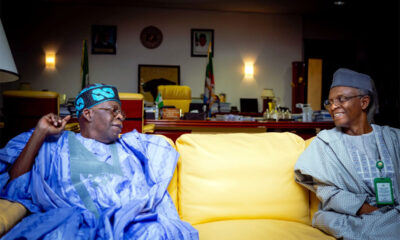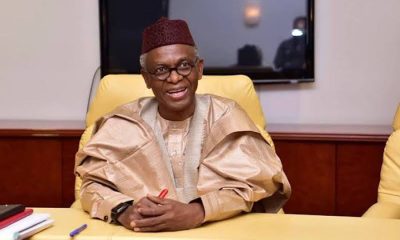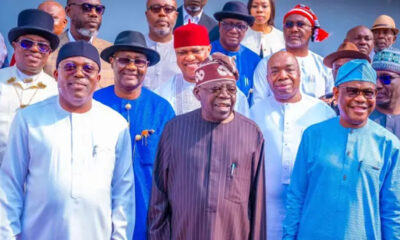Opinion
Tinubu’s risky Niger gamble, Shetty’s embarrassment, by Farooq Kperogi
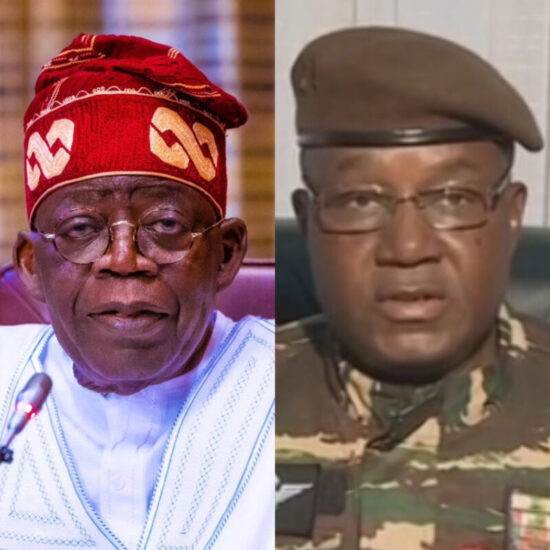
Tinubu’s risky Niger gamble, Shetty’s embarrassment, by Farooq Kperogi
President Bola Ahmed Tinubu recently wrote to the Senate to inform it of an impending “Military build up and deployment of personnel for military intervention to enforce compliance of the military junta in Niger should they remain recalcitrant.” This is a dangerous, ill-advised, potentially self-destructive gamble Tinubu would do well to give up because it has the potential to consume not just him but also Nigeria.
I detest military regimes because I am repulsed by any system that imposes unequal, predetermined structural limits on the aspirational compass to leadership. It is for the same reason that I despise the unearned, inherited authority that monarchies represent. Everyone should, at least in theory if not in practice, have the latitude to aspire to the highest level of leadership in the land.
Military rule limits leadership to professional people, as monarchies limit leadership to bloodline.
Additionally, as someone who came of age during totalitarian military regimes, I loathe the brutality and dehumanization that accompany all military rules and wish that no country would ever have to endure the nightmare of military monocracies.
But going to war with another country because it unfortunately devolved into a system of government that, in our judgement, is abhorrent, is unwarranted arrogant, provocative, and reckless. This is particularly more so because, at least for now, the new military junta in Niger Republic enjoys enormous goodwill among the vast majority of the citizens of the country.
I have seen massive demonstrations in support of the new military regime in rural and urban Niger— and against President Bola Tinubu whom demonstrators have rechristened “Ebola Tinubu” to signal the toxicity and ‘unwelcomeness’ of his intrusion into the internal affairs of their country. Nigeriens obviously have no problems at the moment with the junta in power. When they do, they’ll find a way to deal with it. Who are we to tell them how they should conduct their affairs and whom they should prefer as their rulers?
Plus, in Nigeria, the tide of public opinion is overwhelmingly against any form of Nigeria-led military aggression to restore civilian rule in Niger. Nigeria is itself wracked by disabling internal turmoil on multiple fronts, which the Tinubu administration hasn’t yet shown any willingness to confront, much less contain. Why is Tinubu igniting a fire in another person’s home to “resolve” a squabble there instead of putting out the enduring conflagration in his?
And who is paying for this unsolicited, foolhardy misadventure? Nigerians have been pushed to the very edge of existence (and several have already fallen off the cliff) by the cruel removal of fuel subsidies, yet the Tinubu administration will expend billions (that it repeatedly says the country doesn’t have) to start a needless and avoidable war in a country that is at peace with its anomaly.
Is it the 1 trillion naira the government claimed it has saved from the removal of subsidies that it will use to fight a thoughtless war in Niger that has neither tactical nor strategic benefits for Nigeria? It makes absolutely no sense.
Nigeriens don’t want a war. Nigerians, too, don’t. On whose behalf is Tinubu starting this pointless war then? “Democracy”? Whose “democracy”?
Well, if preservation of civilian rule is the sole motivation for Tinubu’s intervention in Niger, why is he unconcerned about military rule in Mali, Burkina Faso, and Guinea, which are also members of the Economic Community of West African States (ECOWAS)?
True, Tinubu wasn’t president when these other coups took place, but what’s stopping him from adding Mali, Burkina Faso, and Guinea to his list of West African countries that must reinstate their ousted civilian presidents if “democracy” is his overriding concern?
The only thing that makes sense at this point is the widespread insinuation that Tinubu is doing the bidding of Western imperialist powers whose approval he seems insanely desperate for. Since his conservative, stultifying, and asphyxiating economic policies, which have paralyzed the country, are already merely a page from the World Bank and the IMF, it’s apparent that his greatest aspiration isn’t to serve Nigerians but to be a dutiful poodle of the West.
On the instructions of the West, he is killing his people with hunger. On the instructions of the same West, he wants to kill his neighbors with war.
In a private communication, famous University of Texas history professor Toyin Falola pointed out that this is France’s war. “France can give up Mali and Burkina Faso, but Niger is the only country it will not give up without a fight,” he said. “Agadez is the life wire of France, without which it will be using generators like Nigeria. No gas from Russia, and uranium is what it uses for its nuclear energy power. Nigeria cannot use its resources and army to work for France.”
Is Tinubu committing Nigeria to a violent entanglement with Niger on behalf of France because Paris is now his second home—like London used to be Buhari’s second home?
Another dimension to the situation in Niger that Tinubu and his advisers seem oblivious of is that Mohamed Bazoum was a deeply unpopular president who, as Professor Falola said, didn’t win his election. “His predecessor planted him there and gave his [i.e., predecessor’s] son a cabinet appointment,” Falola said. “Niger is a democracy on paper. The mafia distributes rent. Niger has the highest number of land cruisers per capita in Africa.”
What Professor Falola describes isn’t exclusive to Niger, of course. It’s the feature of most “democracies” in Africa. But when you throw Niger’s identity politics into the mix, you are staring at a really combustible situation.
Bazoum comes from Niger’s Arab ethnic minority (with roots in Libya) who constitute less than one percent of the population.
The Hausa constitute a little over 50 percent of the population. The Zarma (whom Hausa people call Zabarma, which probably influenced the Yoruba Sabarumo) are a distant second with a little over 20 percent of the population, although they dominate Niger’s military and civil service. There are other minor groups in the country such as Dendi (whose language is mutually intelligible with Zarma but who consider themselves different from the Zarma), Tuaregs, Kanuri, Fulani, and Gurma.
Former President Mahamadou Issoufou is Hausa, but for personal gains he rigged Mohamed Bazoum, a minority Arab, as his successor. Bazoum was overthrown by Abdourahamane Tchiani who appears to be Zarma going by the region of the country he comes from, but who enjoys the support of the Hausa.
The Zarma and the Hausa (who together constitute more than 70 percent of the population) were resentful that an Arab (with a minimal command of the Hausa language and probably zero proficiency in Zarma and whose people are less than one percent of the population) was imposed as president over them without actually winning a legitimate election.
Forcing the return of Bazoum as president would be a declaration of war against more than 70 percent of the country’s population. But that’s not even my worst fear. In the event of an all-out war, there would be refugees from Niger all over northern Nigeria, which could, in fact, flare up a Yoruba-Hausa ethnic strife in Nigeria because the narrative would be that a Yoruba man is killing Hausa people.
Should that happen, that could end the Tinubu presidency. Is it worth it? I don’t think so.
Maryam Shetty’s Unexampled Ministerial Embarrassment
I had no idea who Maryam Shetty was until I saw what seemed like an unremitting cornucopia of congratulatory messages directed at her on Facebook on her appointment as a minister by President Bola Ahmed Tinubu.
I saw jokes about how almost every (northern) Nigerian on social media somehow found a way to establish connections to her. I was going to join the joke by saying I was connected to her, too, because she shares the same first name as my second daughter, graduated from my alma mater in Nigeria, and even got some sort of certification from Emory University in Atlanta where I live.
Then I woke up Friday morning to the shocking news that her nomination had been withdrawn. I don’t recall if there is any precedent for this kind of embarrassment. Why was her name announced when the president hadn’t made up his mind that he wanted her on his cabinet? The public ridicule she has been subjected to can’t be redeemed by any compensatory appointment.
I thought her appointment sent a symbolic message to young women that they, too, matter. Kwara State governor Abdulrahman Abdulrazaq has already blazed a trail in appointing everyday young women with no roots in political dynasties into commissionership—to the annoyance of political old stagers. I thought President Tinubu was following in Abdulrazaq’s lead and was going to write a full-length column to commend this.
The embarrassing but totally preventable flip-flopping of the Tinubu administration is becoming truly unsettling.
* Kperogi is a Nigerian-American professor and columnist
Opinion
El Rufai’s Arise News mind game with Ribadu, By Farooq Kperogi

El Rufai’s Arise News mind game with Ribadu, By Farooq Kperogi
El Rufai’s Arise News mind game with Ribadu, By Farooq Kperogi
Opinion
Oshiomhole: Behold the 13th disciple of Christ

Oshiomhole: Behold the 13th disciple of Christ
Opinion
AFCON 2025: Flipping Content Creation From Coverage to Strategy

AFCON 2025: Flipping Content Creation From Coverage to Strategy
By Toluwalope Shodunke
The beautiful and enchanting butterfly called the Africa Cup of Nations (AFCON) emerged from its chrysalis in Khartoum, Sudan, under the presidency of Abdelaziz Abdallah Salem, an Egyptian, with three countries—Egypt, Sudan, and Ethiopia—participating, and Egypt emerging as the eventual winner.
The reason for this limited participation is not far-fetched. At the time, only nine African countries were independent. The remaining 45 countries that now make up CAF’s 54 member nations were either pushing Queen Elizabeth’s dogsled made unique with the Union Jack, making supplications at the Eiffel Tower, or knocking at the doors of the Palácio de Belém, the Quirinal Palace, and the Royal Palace of Brussels—seeking the mercies of their colonial masters who, without regard for cultures, sub-cultures, or primordial affinities, divided Africa among the colonial gods.
From then until now, CAF has had seven presidents, including Patrice Motsepe, who was elected as the seventh president in 2021. With more countries gaining independence and under various CAF leaderships, AFCON has undergone several reforms—transforming from a “backyard event” involving only three nations into competitions featuring 8, 16, and now 24 teams. It has evolved into a global spectacle consumed by millions worldwide.
Looking back, I can trace my personal connection to AFCON to table soccer, which I played alone on concrete in our balcony at Olafimihan Street—between Mushin and Ilasamaja—adjacent to Alafia Oluwa Primary School, close to Alfa Nda and Akanro Street, all in Lagos State.
Zygmunt Bauman, the Polish-British sociologist who developed the concept of “liquid modernity,” argues that the world is in constant flux rather than static, among other themes in his revelatory works.
For the benefit of Millennials (Generation Y) and Generation Z—who are accustomed to high-tech pads, iPhones, AI technologies, and chat boxes—table soccer is a replica of football played with bottle corks (often from carbonated drinks or beer) as players, cassette hubs as the ball, and “Bic” biro covers for engagement. The game can be played by two people, each controlling eleven players.
I, however, enjoyed playing alone in a secluded area, running my own commentary like the great Ernest Okonkwo, Yinka Craig, and Fabio Lanipekun, who are all late. At the time, I knew next to nothing about the Africa Cup of Nations. Yet, I named my cork players after Nigerian legends such as Segun Odegbami, Godwin Odiye, Aloysius Atuegbu, Tunji Banjo, Muda Lawal, Felix Owolabi, and Adokiye Amiesimaka, among others, as I must have taken to heart their names from commentary and utterances of my uncles resulting from sporadic and wild celebrations of Nigeria winning the Cup of Nations on home soil for the first time.
While my connection to AFCON remained somewhat ephemeral until Libya 1982, my AFCON anecdotes became deeply rooted in Abidjan 1984, where Cameroon defeated Nigeria 3–1. The name Théophile Abéga was etched into my youthful memory.
Even as I write this, I remember the silence that enveloped our compound after the final whistle.
It felt similar to how Ukrainians experienced the Battle of Mariupol against Russia—where resolute resistance eventually succumbed to overwhelming force.
The Indomitable Lions were better and superior in every aspect. The lion not only caged the Eagles, they cooked pepper soup with the Green Eagles.
In Maroc ’88, I again tasted defeat with the Green Eagles (now Super Eagles), coached by the German Manfred Höner. Players like Henry Nwosu, Stephen Keshi, Sunday Eboigbe, Bright Omolara, Rashidi Yekini, Austin Eguavoen, Peter Rufai, Folorunsho Okenla, Ademola Adeshina, Yisa Sofoluwe, and others featured prominently. A beautiful goal by Henry Nwosu—then a diminutive ACB Lagos player—was controversially disallowed.
This sparked outrage among Nigerians, many of whom believed the referee acted under the influence of Issa Hayatou, the Cameroonian who served as CAF president from 1988 to 2017.
This stroll down memory lane illustrates that controversy and allegations of biased officiating have long been part of AFCON’s history.
The 2025 Africa Cup of Nations in Morocco, held from December 21, 2025, to January 18, 2026, will be discussed for a long time by football historians, raconteurs, and aficionados—for both positive and negative reasons.
These include Morocco’s world-class facilities, the ravenous hunger of ball boys and players (superstars included) for the towels of opposing goalkeepers—popularly dubbed TowelGate—allegations of biased officiating, strained relations among Arab African nations (Egypt, Algeria, Tunisia, and Morocco), CAF President Patrice Motsepe’s curt “keep quiet” response to veteran journalist Osasu Obayiuwana regarding the proposed four-year AFCON cycle post-2028, and the “Oga Patapata” incident, where Senegalese players walked off the pitch after a legitimate goal was chalked off and a penalty awarded against them by DR Congo referee Jean-Jacques Ndala.
While these narratives dominated global discourse, another critical issue—less prominent but equally important—emerged within Nigeria’s media and content-creation landscape.
Following Nigeria’s qualification from the group stage, the Super Eagles were scheduled to face Mozambique in the Round of 16. Between January 1 and January 3, Coach Eric Chelle instituted closed-door training sessions, denying journalists and content creators access, with media interaction limited to pre-match press conferences.
According to Chelle, the knockout stage demanded “maximum concentration,” and privacy was necessary to protect players from distractions.
This decision sparked mixed reactions on social media.
Twitter user @QualityQuadry wrote:
“What Eric Chelle is doing to journalists is bad.
Journalists were subjected to a media parley under cold weather in an open field for the first time in Super Eagles history.
Journalists were beaten by rain because Chelle doesn’t want journalists around the camp.
Locking down training sessions for three days is unprofessional.
I wish him well against Mozambique.”
Another user, @PoojaMedia, stated:
“Again, Eric Chelle has closed the Super Eagles’ training today.
That means journalists in Morocco won’t have access to the team for three straight days ahead of the Round of 16.
This is serious and sad for journalists who spent millions to get content around the team.
We move.”
Conversely, @sportsdokitor wrote:
“I’m not Eric Chelle’s biggest supporter, but on this issue, I support him 110%.
There’s a time to speak and a time to train.
Let the boys focus on why they’re in Morocco—they’re not here for your content creation.”
From these three tweets, one can see accessibility being clothed in beautiful garments. Two of the tweets suggest that there is only one way to get to the zenith of Mount Kilimanjaro, when indeed there are many routes—if we think within the box, not outside the box as we’ve not exhausted the content inside the box.
In the past, when the economy was buoyant, media organisations sponsored reporters to cover the World Cup, Olympics, Commonwealth Games, and other international competitions.
Today, with financial pressures mounting, many journalists and content creators seek collaborations and sponsorships from corporations and tech startups to cover sporting events, who in turn get awareness, brand visibility, and other intangibles.
As Gary Vaynerchuk famously said, “Every company is a media company.” Yet most creators covering AFCON 2025 followed the same playbook.
At AFCON 2025, most Nigerian journalists and content creators pitched similar offerings: on-the-ground coverage, press conferences, team updates, behind-the-scenes footage, analysis, cuisine, fan interactions, and Moroccan cultural experiences.
If they were not interviewing Victor Osimhen, they were showcasing the stand-up comedy talents of Samuel Chukwueze and other forms of entertainment.
What was missing was differentiation. No clear Unique Selling Proposition (USP). The result was generic, repetitive content with little strategic distinction. Everyone appeared to be deploying the same “Jab, Jab, Jab, Hook” formula—throwing multiple jabs of access-driven content in the hope that one hook would land.
The lesson is simple: when everyone is jabbing the same way, the hook becomes predictable and loses its power.
As J. P. Clark wrote in the poem “The Casualties”, “We are all casualties,” casualties of sameness—content without differentiation. The audience consumes shallow content, sponsors lose return on investment, and creators return home bearing the “weight of paper” from disappointed benefactors.
On November 23, 1963, a shining light was dimmed in America when President John F. Kennedy was assassinated.
As with AFCON today, media organisations sent their best hands to cover the funeral, as the who’s who of the planet—and if possible, the stratosphere—would attend. Unconfirmed reports suggested that over 220 VVIPs were expected.
While every newspaper, radio, and television station covered the spectacle and grandeur of the event, one man, Jimmy Breslin, swam against the tide. He chose instead to interview Clifton Pollard, the foreman of gravediggers at Arlington National Cemetery—the man who dug John F. Kennedy’s grave.
This act of upended thinking differentiated Jimmy Breslin from the odds and sods, and he went on to win the Pulitzer Prize in 1986.
Until journalists and content creators stop following the motley and begin swimming against the tide, access will continue to be treated as king—when in reality, differentiation, aided by strategy, is king.
When every journalist and content creator is using Gary Vaynerchuk’s “Jab, Jab, Jab, Hook” template while covering major sporting events, thinkers among them must learn to replace one jab with a counterpunch—and a bit of head movement—to stay ahead of the herd.
Toluwalope Shodunke can be reached via tolushodunke@yahoo.com
-

 Education8 hours ago
Education8 hours agoCheck Your Name: UNILORIN Releases Updated NELFUND Refund List for 2024/2025 Students
-

 News3 days ago
News3 days agoAso Rock Goes Solar as Tinubu Orders National Grid Disconnection
-

 metro3 days ago
metro3 days agoLagos Police Launch Manhunt for Suspect in Brutal Ajah Murder
-

 Sports3 days ago
Sports3 days agoLookman Shines as Atlético Madrid Hammer Barcelona 4-0
-

 metro1 day ago
metro1 day agoBoko Haram Terrorists Release Video of 176 Abducted Kwara Residents
-
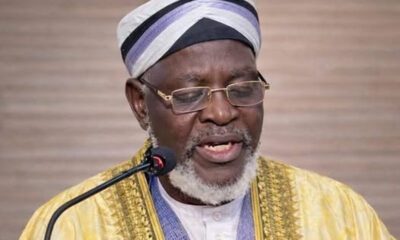
 metro2 days ago
metro2 days agoCourt Orders DIA to Produce Cleric Accused of Coup Plot by February 18
-

 metro1 day ago
metro1 day agoWoman Arrested Over Murder of Nigerian E-Hailing Driver in South Africa
-

 News3 days ago
News3 days agoMPAC Hails Supreme Court Verdict Affirming Muslim Students’ Right to Worship at RSU



